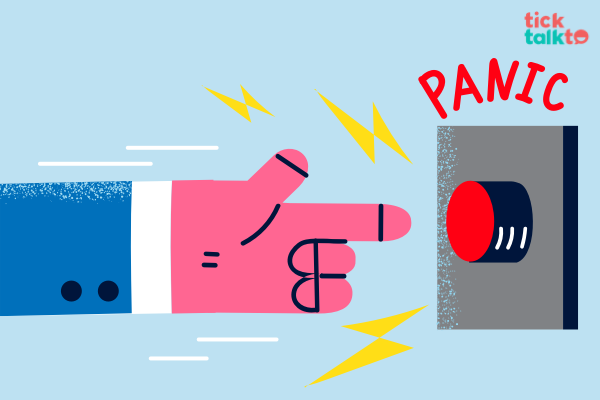Anxiety is a usual way of reacting to danger, it is the fight-or-flight response that is triggered when you feel threatened by any person or a situation. In simple fashion, Anxiety is a state that occurs when you feel threatened in any situation. Anxiety is an emotion characterized by feelings of tension, worried thoughts, and physical changes like increased blood pressure.1 These dangerous situations can be real or anticipated, for example; cracking an interview, appearing for an examination, going on a date or first day at school.
Anxiety is a very common condition that can happen to anybody.
“I have anxiety issues now for the last three to four years and it’s something that I am dealing with in a positive way, every single day.”
Shraddha Kapoor2
What Anxiety feels like?
Let us Illustrate an example to quote how anxiety feels like. Whenever you get anxious, you feel like someone is following you with a bag full of your thoughts, and even if you try hard you’re unable to get rid of the baggage or the figure carrying the baggage. With each and every thought present in front, you wonder what to do in such a situation? Often want to hide yourself from that figure but are unable to.
Anxiety disorder appears when;
- your responses are uncontrollable, and
- your ability to function gets disrupted by anxiety.
Major Anxiety disorders include;
Generalized Anxiety Disorder
GAD is when you feel discomfort in your day to day work, you feel anxious even on small things. This mental state happens due to the disturbance in the chemicals present in the brain which are linked to a person’s mood for example: serotonin etc. You can assess GAD by taking the Generalized Anxiety Disorder 7 (GAD-7) on the TickTalkTo app.
Obsessive-compulsive Disorder
An overwhelming urge or desire to perform a task continuously, leading by intrusive and distressing thoughts. Easily reflects in the daily habits of a person for example: washing hand, cleaning or washing.
Post-traumatic Stress Disorder
Generally seen after experiencing a huge incident, for example: being in a war zone, encountering something brutal or un obvious, surviving a disaster.
Phobias
An excessive or repeated fear of something. For example: fear of heights, animals, places and so on.
Panic Attacks
Sudden intense fear that brings a person to the state of panic attack which involves feeling of choking, people often mis concept panic attack as a heart attack.
Agoraphobia
Agoraphobia is the fear of being at places where you feel difficult to escape from. For example: Being in a public transport or any crowded place.
Coronaphobia
The COVID-19 pandemic has multiple socioeconomic and psychological ramifications. It has caused mental problems such as fear, anxiety as well as physical problems in humans. The concern of COVID-19 has been called coronaphobia.3 You can assess COVID-19 related anxiety by taking the Coronavirus Anxiety Scale (CAS) on the TickTalkTo app.
What Anxiety disorder does to your body?
Anxiety disorders can also affect the functioning of your body in several ways including slowing the functioning and processing of your immune system, cardiovascular system, respiratory system, central nervous system and excretory and digestive system.
Causes of Anxiety attacks?
Anxiety attacks can also be caused by anxiety issues when severe, features stronger emotions, more intense and overwhelming feelings than other types of anxiety disorders.
It tends to start when something triggering appears or you feel you get stuck in a situation. Anxiety attacks are sudden and occur without a warning. For example; an important examination you have to appear for. Anxiety attacks generally peak within 10 minutes and rarely lasts more than 30 minutes. Within this short period of time you get to experience a rush of emotions and with the physical changes people may misconcept anxiety attacks with a heart attack. Where you totally loose control and the feeling of terror or fear reaches to the extent.
Anxiety attacks affects your body in several ways including;
- Pounding heart rate,
- Sweating,
- Heart palpitation or chest pain,
- Nausea or stomach cramps,
- Trembling or shaking ,
- Feeling detached or unreal,
- Hot flashes or chills,
- Numbness or tingling,
- Dry mouth.
A panic attack or anxiety attack do share some common symptoms but they are not the same. According to DSM-V anxiety attack is not mentioned anywhere so it comes under a category of panic attack.
Self-help for Anxiety
- Get enough sleep: Lack of sleep can cause an imbalance in the functioning of your body. A quality sleep of seven to 9 hours is highly suggested.
- Managing food and water intake: 2 litres of water per 20 kgs can be consumed followed by a proper diet.
- Connecting: Cutting off yourself from people and your day to day may also cause you stress and anxiety. Try to meet up with your friends or the people you trust. Connecting to an activity you love can also help.
- Be careful about caffeine, alcohol, and nicotine: Consuming such ingredients only makes your anxiety worse. Avoid the intake of alcohol, or caffeine in any form.
- Relaxation techniques: Includes meditation or working out, sudden body movements may help you fade your overwhelming feelings.
- Keep a journal: Keeping a journal and recording the track of your personal life may help you identify stress causing situations.
- Learn time management: Time management may also be helpful in provoking situations resulting in teaching you control your anxiety.
Resources to help you fight anxiety disorders
- Normalising talking about it: Talking about your feelings often turns out to be quite overwhelming, but trying to accept your feelings can be counted as a huge step in the process.
- Assessments: It’s important to diagnose the problem before opting for a treatment. Assessments like GAD-7 and CAS can help do the same.
- Treatment: Anxiety disorders can be treated, some specific treatment approaches depend on the type of anxiety disorders. Mostly, they can be treated with therapy, medication or the combination of both. Seek help from trained professionals only.
- Break the cycle: Whenever you feel anxious break the cycle either by taking a brisk walk or talking about your feelings.
- Online counselling and therapy: Taking a counselling session by trained professionals help you be more aware of your feelings and helps you work on your anxiety. You can access hundreds of trained psychologists and psychiatrists from the comfort of your home via the TickTalkTo app.
Remember, having symptoms of anxiety is different than having an anxiety disorder. If you think you have some symptoms of anxiety, it may be time to start a conversation with someone you trust to explore what is going on and how things can get better.

 Yashika Agarwal
Yashika Agarwal


